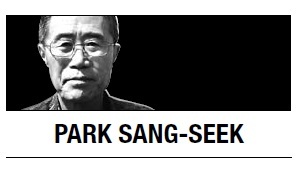[Park Sang-seek] Current challenges to US global leadership
By Lee Hyun-jooPublished : Aug. 21, 2016 - 16:09
 Recently, a debate on whether US hegemony in the world is declining and whether it is necessary for world peace has intensified in both West and non-West. This debate has also become a top campaign issue in the American presidential election.
Recently, a debate on whether US hegemony in the world is declining and whether it is necessary for world peace has intensified in both West and non-West. This debate has also become a top campaign issue in the American presidential election.
The leaders of the non-Western countries antagonistic to the US, including Russia and China, vehemently condemn American hegemony and its ideological foundation, American exceptionalism. A majority of the intellectuals in the non-West are also critical of America’s “imperialistic” behavior and American exceptionalism. Why is American foreign policy confronted with such a strong antagonism from home and abroad? What are the implications for the future world order and Northeast Asia?
After the cold war the US has been pursuing a global foreign policy to promote two goals: Unilateral global leadership (or hegemony) and a democratic and capitalist world order. Until the 9/11 event this foreign policy had not faced any serious resistance at home and abroad mainly because globalization was moving fast and the world economy was recovering from a great financial crisis, and also because fundamentalist Islamic movements were not too strong.
In the wake of the event, the Bush Administration tried to show the world that America had the willingness and capability to realize its twin foreign policy goals through the American invasions of Afghanistan and Iraq. He justified his actions by American exceptionalism. American exceptionalism is a doctrine that there are the universal values originated from Western civilization and American history which include individual freedom, equality, democracy, separation of secular and spiritual authority and humanitarian intervention and that America upholds these universal values and has a moral duty to propagate them across the globe.
Bush junior resorted to what scholars call evangelism when he forced the non-Western states that were antagonistic to the US to accept these American values. The Democratic administration under Obama has been pursuing basically the same foreign policy goals and believes in American exceptionalism but opposes Bush’s evangelism and instead advocates examplarism.
Most political and intellectual elites in the non-West are critical of America’s neoliberal internationalism and international finance capitalism.
First, neoliberal internationalists advocate spread of democracy and Western values to the non-West. Bush junior went further and attempted to transplant them to the non-West. But political and intellectual elites in the non-West oppose the enforcement of democracy and Western civilization on the non-West.
They argue that their most urgent and important task is to build a modern nation-state by consolidating national unity and rapid economic development and that in the early stage of nation-state building democracy and Western values can be a hindrance, not a facilitator. This is the reason why they strongly oppose intervention of domestic affairs by foreign powers.
Second, international finance capitalists strongly push for free market and free movement of capital. For this purpose, they try to control the international financial institutions. The American government supports this movement. Most political and intellectual elites in the non-West cautiously support free market but are critical of free movement of capital because they believe that it creates financial crises and makes the rich richer and the poor poorer.
Third, many political and intellectual elites in the non-West believe that America pushes for globalization, free market and free capital movement, democracy and Western values for the preservation of its global domination, not for world peace and humanity. Most international terrorist movements use this argument as their most powerful propaganda weapon against American foreign policy.
In short, they believe that America’s primary goal is to maintain and strengthen its global hegemony and its other goals are to justify and camouflage its primary goal.
Now, we witness that Americans themselves are deeply divided into two opposing views of American foreign policy: the neoliberal internationalist doctrine and the America first principle. According to the PEW poll in 2016, 57 percent of Americans agree that “The US should deal with its own problems and let others deal with theirs the best they can.” This anti-Establishment force is very critical of the neoliberalist foreign policy.
The realist approach rather than the neoliberalist approach to world affairs is more desirable. First, the neoliberal approach will make the non-West more antagonistic toward the US Secondly, the contemporary world is still a state-centered world. Therefore, neither a unipolar nor bipolar system can maintain world peace. In Northeast Asia, the US should play the role of a balancer, not of a global hegemon, for the maintenance of peace and prosperity in the region.
In 1966 William Fulbright defined arrogance of power as “the tendency of great nations to equate power with virtue and major responsibilities with a universal mission.”
By Park Sang-seek
Park Sang-seek is a former rector of Graduate Institute of Peace Studies at Kyung Hee University and the author of “Globalized Korea and Localized Globe.” – Ed.








![[Graphic News] More Koreans say they plan long-distance trips this year](http://res.heraldm.com/phpwas/restmb_idxmake.php?idx=644&simg=/content/image/2024/04/17/20240417050828_0.gif&u=)
![[KH Explains] Hyundai's full hybrid edge to pay off amid slow transition to pure EVs](http://res.heraldm.com/phpwas/restmb_idxmake.php?idx=644&simg=/content/image/2024/04/18/20240418050645_0.jpg&u=20240419100350)





![[From the Scene] Monks, Buddhists hail return of remains of Buddhas](http://res.heraldm.com/phpwas/restmb_idxmake.php?idx=652&simg=/content/image/2024/04/19/20240419050617_0.jpg&u=20240419175937)

![[KH Explains] Hyundai's full hybrid edge to pay off amid slow transition to pure EVs](http://res.heraldm.com/phpwas/restmb_idxmake.php?idx=652&simg=/content/image/2024/04/18/20240418050645_0.jpg&u=20240419100350)

![[Today’s K-pop] Illit drops debut single remix](http://res.heraldm.com/phpwas/restmb_idxmake.php?idx=642&simg=/content/image/2024/04/19/20240419050612_0.jpg&u=)